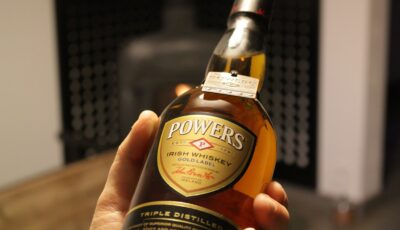When we think of whisky, we inevitably think of the two great nations that vie for its glory and paternity: Ireland and Scotland. Two Celtic countries, famous for their expertise, proudly boasting centuries-old traditions, distillation methods and, of course, legendary brands. But have you ever wondered who invented whisky? Which country produces the best nectar? To find out more, don your kilt or tweed jacket and follow the guide for some surprising discoveries!

A whiskey – © maeching
The history of whisky is as hazy as the landscapes of the Emerald Isle and the Highlands. And in the collective imagination, we tend to attribute the paternity of whisky to Scotland. A sad mistake, since it is thought that the Irish were the first to distill this beverage, many years before the Scots! Legend has it that it was Saint Patrick who brought the first still to Ireland, encouraging the Irish to create their first “eaux de vies”. A theory often considered a little far-fetched by historians. If we stick to the facts alone, we can attribute the paternity of this invention to Irish monks who, as early as the XIIᵉ century, would have brought back the distillation technique after their travels on the European continent (where distillation was then used for medicinal purposes). As for the written records, they don’t lie: Ireland was a forerunner compared to Scotland!

The Bushmills distillery in Northern Ireland is said to be the oldest in the world! – @ ChristopherHeaney
If official licenses are anything to go by, it’s Ireland’s Old Bushmills Distillery (located in Northern Ireland). The distillery received its first license in 1608, making it the oldest licensed distillery in the world. However, things are a little too easy for Scotland, which constantly asserts that The Glenturret Distillery is in fact the oldest distillery in the World still in operation, with origins unofficially dating back to 1775 (and potentially even earlier, according to some sources). But on paper, Bushmills retains its doyenne crown thanks to its historic royal licence.
This difference in spelling stems from cultural and linguistic traditions, but not from real differences in composition.

Quiraing in Scotland – 12019 – pixabay
But why, you may ask, is Scotland tending to supplant Ireland as the whisky maker, when Ireland was the forerunner? To find out, we need to go back in time. As they developed, Scottish merchants were particularly active in exporting their “Scotch Whisky”. Their commercial network, combined with the power of the British Empire, helped to spread their product to every continent… while the Irish did not benefit from this commercial influence. In addition, the Scots were quick to understand the marketing power of blends, enabling a standardization of taste. This made Scotch whisky more accessible to the general public, boosting its worldwide popularity, whereas Irish whiskey might otherwise have seemed more difficult to grasp. Strong trade associations such as the Scotch Whisky Association (SWA) also played a major role. They put in place strict regulations and promoted Scotch whisky by guaranteeing its quality. Ireland, for its part, experienced political and economic difficulties, as well as a sharp industrial slowdown, leading to the closure of many distilleries during the XXᵉ century. Today, the situation is gradually reversing with the reopening of distilleries and the rise of Irish whiskey, but Scotland still has a head start in terms of notoriety. However, more and more Irish brands are emerging and gaining ground on the markets.

Powers whiskey – Ireland Guide.com
The answer is inevitably subjective! Palates vary from one enthusiast to another.
The important thing is to discover, taste and form your own opinion. After all, it’s not for nothing that distilleries compete in innovation and excellence to seduce our taste buds!
So it’s hard to pinpoint a single trophy, given the rich, shared heritage. But one thing’s for sure: wherever you travel, Ireland or Scotland will welcome you with generous glasses and great stories about this age-old drink.
Alcohol abuse is dangerous for your health. Drink in moderation.